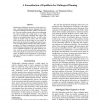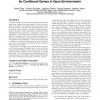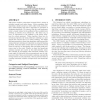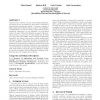IJCAI
2003
15 years 3 months ago
2003
Planning has traditionally focused on single agent systems. Although planning domain languages have been extended to multiagent domains, solution concepts have not. Previous solut...
108
click to vote
IJCAI
2007
15 years 3 months ago
2007
This paper is a comparative study of game-theoretic solution concepts in strictly competitive multiagent scenarios, as commonly encountered in the context of parlor games, competi...
141
click to vote
ICALP
2010
Springer
15 years 4 months ago
2010
Springer
We study bargaining games between suppliers and manufacturers in a network context. Agents wish to enter into contracts in order to generate surplus which then must be divided amon...
121
click to vote
ATAL
2008
Springer
15 years 4 months ago
2008
Springer
Coalitional games raise a number of important questions from the point of view of computer science, key among them being how to represent such games compactly, and how to efficien...
107
Voted
ATAL
2008
Springer
15 years 4 months ago
2008
Springer
Coalition formation is an important capability for automated negotiation among self-interested agents. In order for coalitions to be stable, a key question that must be answered i...
123
click to vote
PODC
1995
ACM
15 years 5 months ago
1995
ACM
We show how solution concepts in games such as Nash equilibrium, correlated equilibrium, rationalizability, and sequential equilibrium can be given a uniform definition in terms ...
112
click to vote
GECCO
2005
Springer
15 years 7 months ago
2005
Springer
Assume a coevolutionary algorithm capable of storing and utilizing all phenotypes discovered during its operation, for as long as it operates on a problem; that is, assume an algo...
125
click to vote
GECCO
2007
Springer
15 years 8 months ago
2007
Springer
This paper explores connections between Ficici’s notion of solution concept and order theory. Ficici postulates that algorithms should ascend an order called weak preference; th...
102
click to vote
ATAL
2009
Springer
15 years 8 months ago
2009
Springer
Game-theoretic solution concepts, such as Nash equilibrium, are playing an ever increasing role in the study of systems of autonomous computational agents. A common criticism of N...




